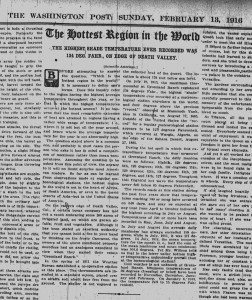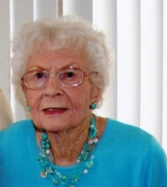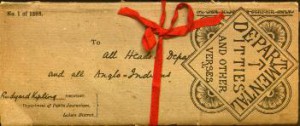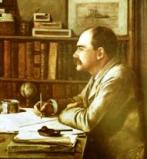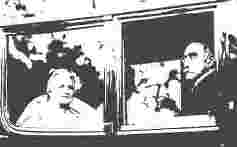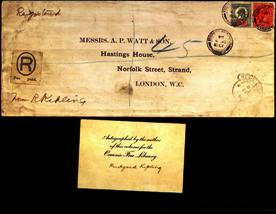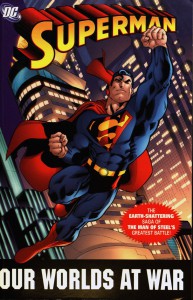Caryn is the recipient of the Resident Appreciation Award from the Child Health department. As librarian for the Child Health department, she received a plaque in recognition of the training and support she provides to residents, assisting them in preparing for their weekly Evidence Based Medicine Conference and teaching them to find answers to their clinical questions.
Congratulations, Caryn! 
Resources and Services
I Scream, You Scream…
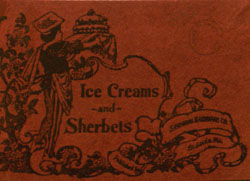
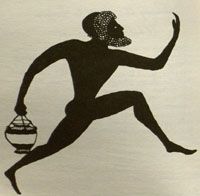
Marco Polo is often credited with bringing sherbet and ice recipes to Europe after having learned them on his famous voyages. These were again kept mostly by the royals and others in the higher tiers of nobility. Some of these recipes may have been known to the English royalty earlier, as there are reports of Richard the Lionhearted eating sherbets in 1191 while on a Holy Crusade.
When people realized that adding salt to snow and ice helped to increase the coldness and help keep it, clever chefs now had more freedom than ever to experiment with different flavors and mixtures. The French chef Jacques, from the court of Charles of England and Vatel, the chef of King Louis XVI have both been cited among the inventors of cream ice which, with the help of the Germans, Spanish, Italians, and possibly the Scandinavians, contributed to what became known as ice cream when these recipes came to America, where it was further influenced mostly by English and French methods.
The first written evidence of ice cream in America comes from a letter written May 17, 1744 by a guest of Governor Bladen of Maryland that describes this curious ice cream treat. In the latter half of the 18th century, ice cream's popularity really picked up with those that could afford it, including such well-known figures as George Washington and Thomas Jefferson.
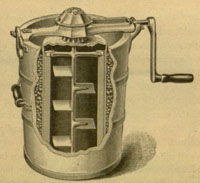
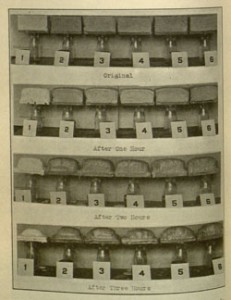
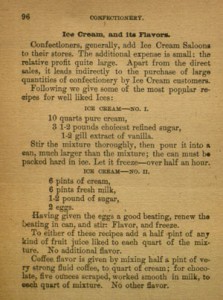
Have a happy National Ice Cream Day!
Arbuckle, W. S. The Little Ice Cream Book. [S.l.]: W.S. Arbuckle, 1981. Print.
"International Dairy Foods Association." July Is National Ice Cream Month. N.p., n.d. Web. 17 July 2013. http://www.idfa.org/news–views/media-kits/ice-cream/july-is-national-ice-cream-mon/.
Mertens, Randy. "About Us." Buck's Ice Cream Place:. N.p., 12 Mar. 2010. Web. 17 July 2013. http://bucks.missouri.edu/about/history.php.
More online access to Wiley journals!
We recently purchased the “backfiles” of several Wiley journals. You now have electronic access to all years of:
Equine Veterinary Journal (1968 – present)
Journal of Small Animal Practice (1960 – present)
Journal of Veterinary Emergency and Critical Care (1991 – present)
Journal of Veterinary Internal Medicine (1987 – present)
Veterinary Clinical Pathology (1972 – present)
Veterinary Radiology & Ultrasound (1960 – present)
Veterinary Surgery (1971 – present)
Previously, these titles were available online from 1997 to present.
Enjoy!
Wildfire Prevention
While we’re feeling the heat as truly summer-like temperatures in the 90s are making themselves known, the risk of wildfire increases throughout the country.
At the time this was written, 24 wildfires were burning throughout the country. Maps put out by the National Interagency Fire Center (like this one) show the location of “large incidents,” or large uncontrollable fires that were currently burning at the time of map-making. Other maps (like this one) can help you determine the likelihood of a wildfire starting in your area.
As a wise bear has said, we all have the power to prevent wildfires and forest fires. Here at Special Collections, anyone looking through our poster collection will find several 1940s-era posters reminding us of this fact.

Smokey Bear, the bear who has such confidence in us humans to prevent forest fires, is the longest running PSA campaign in United States history. In 1950, a bear cub was orphaned by a forest fire in New Mexico. Rangers rescued him from the fire and nursed him back to health until he eventually left for a zoo in Washington, D.C. where he became the living symbol for the Smokey Bear fire prevention campaign that is still popular today.
 As the poster to the left suggests, the importance of preventing wildfires was felt very strongly in the forties, due to the war-effort. In fact, the first half of that decade was when this awareness/prevention campaign really started to spread like wildfire (pun intended). Large, uncontained fires would take attention and supplies away from the troops that were in need of them, making forest fires not only a danger to those near them, but also to those overseas. Luckily for all of us, there are several easy steps to take to prevent uncontained fires conveniently recorded on this poster, such as making sure your campfire has been put out thoroughly before breaking camp.
As the poster to the left suggests, the importance of preventing wildfires was felt very strongly in the forties, due to the war-effort. In fact, the first half of that decade was when this awareness/prevention campaign really started to spread like wildfire (pun intended). Large, uncontained fires would take attention and supplies away from the troops that were in need of them, making forest fires not only a danger to those near them, but also to those overseas. Luckily for all of us, there are several easy steps to take to prevent uncontained fires conveniently recorded on this poster, such as making sure your campfire has been put out thoroughly before breaking camp.
In addition to putting forth practical reasons for being careful with fire, the forestry service around this time also tugged at the heartstrings of Americans by issuing posters with Bambi and friends, imploring those that look upon them to not burn down their homes. As the Disney movie had just debuted the previous year, this poster would have been particularly effective in its message of reminding people of the devastating effects fires have on forest wildlife.
So remember:
- “only you can prevent wildfires”
- to see these posters (and others) all you need to do is visit us at Special Collections!
Baby, It’s Hot Outside
The dog days of summer are finally upon us after a long and snowy winter. As the mercury rises, we all begin to hear (and ask) that famous age-old, sarcastic question: “Can it possibly get any hotter?” Special Collections is here to forever lay that question to rest by providing the answer.
Yes. Much hotter.
One hundred years ago today, on July 10, 1913, the hottest temperature ever was recorded, right here in the USA. The appropriately named Furnace Creek Ranch in Death Valley, California reported a sizzling 134 °F (56.7 °C). According to the National Park Service, summer temperatures in Death Valley average 120 °F throughout the day, before dropping into the nineties at night.
A century-old Washington Post headline shows off the new world record.
Swing on in to Special Collections to escape our own summer heat wave. Access to any of our books, microfilms or comics (along with our air conditioning) is, of course, free of charge.
Terrific Tales Exhibit
“Terrific Tales: From Fairies to Fables” is on exhibit in the Library Colonnade. The exhibit is brought to you by Special Collections and will be on display July 1st – August 15th.
July 4, 1813
 Happy Independence Day! While we celebrate with fireworks, picnics, and other festivities, nineteenth-century Americans often attended public speeches by popular religious and political figures. The Fourth of July Orations Collection, made up of over 450 sermons and addresses, documents the issues that mattered to the American people from 1791 to 1925, and allows us to recapture some of the spirit of Independence Days Past.
Happy Independence Day! While we celebrate with fireworks, picnics, and other festivities, nineteenth-century Americans often attended public speeches by popular religious and political figures. The Fourth of July Orations Collection, made up of over 450 sermons and addresses, documents the issues that mattered to the American people from 1791 to 1925, and allows us to recapture some of the spirit of Independence Days Past.
On Independence Day* 200 years ago, the United States was 13 months into the War of 1812, and the outlook wasn’t good. The American military, cobbled together from state militias and lacking professional leadership, lost battle after battle to smaller but better trained and equipped British forces. By the end of the summer of 1813, the Americans would be forced to flee in disarray from the advancing British. Public sentiment had never been in favor of the war (as we saw in last year’s Independence Day address); heavy losses and the looming possibility of defeat made the war even less popular, especially in New England.
This year’s featured speech comes to us from Abiel Holmes, a clergyman and author from Cambridge, Massachusetts, who is perhaps best known to us today as the father of Oliver Wendell Holmes, Sr. (the author) and the grandfather of Oliver Wendell Holmes, Jr. (the Supreme Court justice).
 Holmes presented his speech before the Washington Benevolent Society in Washington, D.C. As was common in his time, the first half of the speech is a lengthy panegyric on the virtues George Washington. However, midway through the address, Holmes changes direction. He condemns the current war and calls for a return to Washingtonian values, principles and policies, particularly that of neutrality.
Holmes presented his speech before the Washington Benevolent Society in Washington, D.C. As was common in his time, the first half of the speech is a lengthy panegyric on the virtues George Washington. However, midway through the address, Holmes changes direction. He condemns the current war and calls for a return to Washingtonian values, principles and policies, particularly that of neutrality.
That most wars are unnecessary, and therefore unjustifiable, the history of the world plainly shows us. … Republics, no less than despotic governments, have been addicted to war, from the lust of gain, a passion for glory, or some unhallowed motives, equally hostile to their prosperity, and dangerous to their liberties. (21)
Holmes goes on to draw a parallel between warlike Sparta and the United States, suggesting that the new republic would be pulled apart by foreign and civil conflict. He adds, “Whether he [Washington] would ever have sacrificed our peace, or hazarded our liberties, from any considerations, not far more imperious than those alleged as the grounds of the present war, you may conclude, with moral certainty, from his avowed principles, and his pacific administration” (22).
You can read more of Holmes’ speech online. The entire Fourth of July Orations Collection is available at the University of Missouri Digital Library, and also in traditional format in the Special Collections Reading Room
*July 4, 1813, was a Sunday. To avoid conflict with religious observances, Independence Day festivities in many communities were moved to July 5, the following Monday.
TXT Us Your Questions
573-535-6818
Use our new phone number for SMS service to send us quick simple questions of up to 160 characters.
Responses are 160 characters, and may be sent as two messages if needed.
SMS service hours during the summer class session are Mon-Thurs 8am-9pm, Fri 8am-5pm, Sat 11am-5pm and Sun 1pm-9pm.
Questions sent outside of service hours will receive an automated response and be answered the next service day.
Using Ask MU Libraries via SMS service is convenient and safe – your phone number is neither visible nor accessible to us or others.
Your provider’s standard text messaging rates may apply.
For in-depth questions, contact the Ask MU Libraries service .
Kipling and his Collector
A few months ago we received a generous gift of 191 books, mainly first, sometimes first American, editions of Rudyard Kipling, works about him, and a few books with beautiful fore-edge paintings.
Mrs. Helen Jenkins, the donor of the collection, has recently passed away, a few days shy of her 100th birthday. Born in Topeka, in 1913 in the family of the first licensed pharmacist in Kansas, Helen Katherine Gibler Montgomery Jenkins lived a long and a very happy life. She graduated from the University of Missouri in 1935 with a B.A. in journalism and became a professional reporter. With her husband being in the military, she had to move from place to place quite often. At forty-two, she took a job at a public library and having quickly discovered that she loved it much more than journalism, she enrolled in a master’s program in library science and received her librarian’s degree in 1961 from Rutgers University. She went on to become director of the New Jersey Fanwood Library, held offices in the New Jersey Library Association, and edited the monthly newsletter for the Association and the Library School’s alumni magazine. But her true passion was Kipling. This is how she discovered him.
“My husband's great aunt was Flora V. Livingston. She was the librarian in charge of the rare book room at Harvard’s Widener Library for something like 35 years, from about 1910 to the 40s. Her specialty was Kipling and she spent years compiling a bibliography of his work. …To do this, Aunt Flora traveled to England and India and picked up many, many first editions. The best volumes went, of course, to Harvard; the second best she kept for herself. When she died in the late 1940s, she left her books to Paul and me. The boxes sat in our basement for several weeks and finally, one evening, after a cocktail or two, we decided to get down to opening the boxes. Anyway, after I did learn a little about what we had, I began to buy and to add to the really good stuff …”
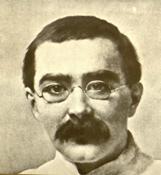 Rudyard Kipling took a firm hold on her imagination. In her lecture on Kipling she talks about him with a note of personal compassion, especially when she speaks of his lonely childhood:
Rudyard Kipling took a firm hold on her imagination. In her lecture on Kipling she talks about him with a note of personal compassion, especially when she speaks of his lonely childhood:
“Kipling’s grandparents, on both sides, were Methodist ministers. His mother, Alice, was one of the five clever and beautiful Macdonald sisters. Kipling’s father, John Lockwood Kipling, was an artist and a teacher, something of an eccentric. He met Alice Macdonald at a picnic. When, at the age of 28, he received a good appointment to head the School of Art in Bombay, he married Alice on March 18, 1865, and they moved to India. Rudyard, sentimentally named for the lake where his parents met, was born on December 30 of the same year.
This was Victorian England and Colonial India. Children of the upper classes were customarily turned over to servants. They saw their parents mainly when Daddy was dressed in his regimental finery and Mother was in an evening gown. Indian servants were trained to accede to any demand from their young charges, with the result, at least in the case of Ruddy (his in-family nickname) of a definitely spoiled child. It is reported that he was talkative and untidy, incessantly asking questions and expressing his opinions without hesitation. “
Her next passage, about his early years, reminds one of some heart-wrenching pages from Dickens.
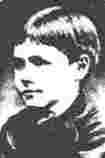 “When he was six years old, Ruddy’s parents packed him and his three-year-old sister, Beatrice, off to England to escape the cholera and the heat of India and to be educated. For reasons never known, the children were left to board in the house of a woman whose name the parents got from an ad in the newspaper, rather than with their English relatives. (Maybe they didn’t want difficult Ruddy.) The parents slipped away secretly – the children had not been warned that they were being left – and it was five years before they saw their parents again. Kipling was mistreated, unfairly punished, told he was bad – and for some minor prevarication, sent off to school for several days wearing on his back a sign that said “LIAR”.
“When he was six years old, Ruddy’s parents packed him and his three-year-old sister, Beatrice, off to England to escape the cholera and the heat of India and to be educated. For reasons never known, the children were left to board in the house of a woman whose name the parents got from an ad in the newspaper, rather than with their English relatives. (Maybe they didn’t want difficult Ruddy.) The parents slipped away secretly – the children had not been warned that they were being left – and it was five years before they saw their parents again. Kipling was mistreated, unfairly punished, told he was bad – and for some minor prevarication, sent off to school for several days wearing on his back a sign that said “LIAR”.
“After five years in what he later referred to as the “House of Desolation”, Kipling was sent to an army cram school in Devon for the sons of not-so-well off officers. He was smallish, non-athletic, with dark beetling eyebrows. His thick pebble glasses kept him from any career in the army. But he was tough, funny and clever. He read voraciously and made his mark as school wit and versifier and star writer for the school paper. These school experiences are immortalized in Stalky & Company. Of the characters, “Beetle,” is the young Ruddy.
In 1882, not yet 17, Ruddy went back to India, to Lahore, to become 50% of the staff of the Civil & Military Stalky & Company Gazette, a frontier daily newspaper. He worked 10 to 15 hours a day under the heat and hellish conditions that he describes at the start of The Man Who Would Be King. He was plagued with sleeplessness all his life and to escape this, he wrote much of what would become his first book to be published for general readership, Departmental Ditties”
Departmental Ditties was an immediate success and was reprinted several times. Mrs. Jenkins had copies of the first and six following editions, English and American. Kipling moved to Allahabad and became a full time reporter in a newspaper. Later he sold all his stories and poems to a company that sold them in cheap paperbacks at railway stations in India. Mrs. Jenkins proudly notes that she has all of them in her collection.
Kipling then returns to London. In less than two years he becomes a celebrity. It didn’t spare him from personal misfortunes, which eventually led him to something like a nervous breakdown. In 1890 Kipling quits London and goes on a sea voyage. He befriended young Americans, Wolcott Balestier and his sister Caroline, who in less than a year becomes his wife.
Newlywed Kiplings settle in America, in Vermont where his wife’s parents lived. There he wrote the First and the Second of his Jungle Books.
Helen Jenkins: “Kipling was not completely happy in the United States. He made tactless comments to the press and consequently, got a bad press. To complicate things, his brother-in-law, Beatty Balestier, got into a smoldering argument with him over the use of some land and in a fit of rage, threatened to kill Kipling. A foolish lawsuit against Beatty, which Kipling won, gave the American papers a field day. In 1896, disgusted with this, the Kiplings packed up and went back to England. They came back to the States three years later and Rudyard became seriously ill with pneumonia. He finally recovered, but during his illness, his daughter, Josephine, 7 years old, died of the same illness. Kipling lived for 37 more years, but he never set foot in the United States again.”
Already by his thirties quite famous and well-to-do, he received the Nobel Prize in literature in 1907, thus becoming the first Englishman to get it. However, his life could not escape thorns and scorn. He lost his son in the first World War and could never quite recover from this tragedy. His relations with his wife deteriorated. Some well-known citations from his writings reflect his disenchantment: “The female of the species is more deadly than the male (The Female of the Species); “A woman is only a woman, but a good cigar is a smoke” (The Betrothed); “Down to Gehenna or up to the throne, he travels the fastest who travels alone” (The Winners).
Posterity has not been entirely kind to Carrie Kipling, who was described by some as self-pitying, bossy and possessive. One modern writer even called her “one of the most loathed women of her generation”; * but Henry James, who knew her personally, wrote about “passionate Carrie, remarkable in her force, acuteness, capacity and courage.” Their marriage lasted for more than forty years, she bore him his three much loved children; her practicality shielded him from the humdrum of daily life and allowed him to write. Most likely, without her there would have been no Kipling we know.
With time, his popularity began to fade, some shallow critics regarded him an “imperialist poet” and his perfectly pitched and splendidly carved rhymed poems were deemed old-fashioned and much too patriotic. Helen Jenkins, his passionate collector and a fellow journalist, writes in conclusion: “He died in London on January 18, 1936, and is buried in Westminster Abbey. He has been quoted as saying how fortunate he was that life had dealt him the cards it did – that all he had to do was play them as they lay – the two childhoods, East and West, that gave him two worlds; the journalism that taught him his trade and give him the whole dazzling tapestry of India to work on.”
This splendid gift of Mrs. Jenkins soon will be catalogued and added to the holdings of our Special Collections, thus making our Kipling collection second only to Harvard.
Special gratitude is extended to Mary Jordan, who sent us the picture of Helen Jenkins, her lecture about Kipling, and the obituary
*Adam Nicolson. The Hated Wife: Carrie Kipling, 1862-1939. ISBN 0571208355
Celebrating 75 Years of the Man of Steel
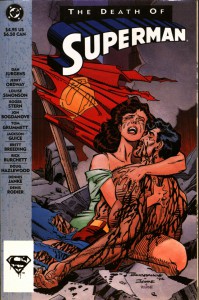 It’s a bird! It’s a plane! It’s Superman’s 75th birthday! On June 30, 1938, Superman debuted in Action Comics #1, marking the unofficial birth of superheroes in comic books. Through decades of films, TV shows and comics, the Last Son of Krypton has permeated our culture and become as American as baseball and apple pie.
It’s a bird! It’s a plane! It’s Superman’s 75th birthday! On June 30, 1938, Superman debuted in Action Comics #1, marking the unofficial birth of superheroes in comic books. Through decades of films, TV shows and comics, the Last Son of Krypton has permeated our culture and become as American as baseball and apple pie.
The creation and history of Superman is as fascinating and heartbreaking as Kal-El’s own fictional backstory. In 1932, a young Jerry Siegel’s father died of a heart attack brought on by the robbery of the family’s small clothing store. Within a few years, he and his artistically-minded friend Joe Shuster created Superman – an orphan who is virtually invincible, and who fights tirelessly to rid Metropolis of evildoers. Siegel and Shuster are eventually commissioned to tell the character’s story in Action Comics. They agree to sell the rights of Superman for $130.
Superman radio serial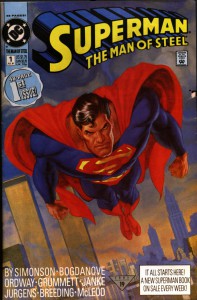 s, television shows and motion pictures soon followed. While the radio was Superman’s preferred medium in the 40’s, come 1951, Iowa-born actor George Reeves donned the red and blue suit to portray the first live-action Man of Steel in the TV series, “The Adventures of Superman.” Reeves stood for Truth, Justice and the American Way for the better part of a decade until he was killed in 1959 by a single gunshot wound to the head. The circumstances surrounding his death are still a mystery.
s, television shows and motion pictures soon followed. While the radio was Superman’s preferred medium in the 40’s, come 1951, Iowa-born actor George Reeves donned the red and blue suit to portray the first live-action Man of Steel in the TV series, “The Adventures of Superman.” Reeves stood for Truth, Justice and the American Way for the better part of a decade until he was killed in 1959 by a single gunshot wound to the head. The circumstances surrounding his death are still a mystery.
After a twenty year absence, the Man of Tomorrow returned, this time played by Christopher Reeve in Richard Donner’s classic 1978 film, “Superman.” Not only was the film a commercial and critical success, it holds a significant historical importance – “Superman” was the first major superhero movie ever released, paving the way for future blockbusters like “Batman”, “Spider-Man”, “Iron Man”, and “The Avengers.” Reeve held the role for three more films, consistently surrounded by an all-star cast including Marlon Brando, Gene Hackman, Terence Stamp and Richard Pryor. Tragically, the Man of Steel proved to be all too human off screen, as a horseback riding accident in 1995 left Reeve paralyzed and confined to a wheelchair until his death in 2004.
The 1990’s and 2000’s were a transitional period for Superman. He appeared in two very successful television series, first in “Lois and Clark: The New Adventures of Superman”, starring Dean Cain as Clark Kent, and then in “Smallville”, with Tom Welling taking the reins. Both series took root in the hearts and minds of a new generation of Americans, and once again, Superman was soaring. In 2006, Brandon Routh took the lead in Bryan Singer’s “Superman Returns.” Cast partly for his likeness to the late Christopher Reeve, Routh’s Superman faced off against his arch nemesis Lex Luthor, portrayed by Academy Award-winner Kevin Spacey. While the film was critically successful, it didn’t resonate well enough with audiences’ wallets to warrant a sequel. For the last seven years, Americans haven’t seen much of Smallville’s favorite son. Even the most recent actors to portray him – Dean Cain, Tom Welling and Brandon Routh – have all but faded from memory, as they struggled to find quality roles in Hollywood.
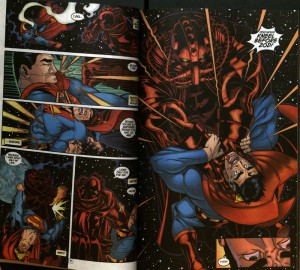 But that all changed last week with the record-breaking release of Zack Snyder’s “Man of Steel”, starring Henry Cavill as Superman and Michael Shannon as the villainous General Zod. The blockbuster proved that Americans’ fascination with Superman is only growing. That love for the character will only continue to grow in the next few years, as star Cavill and director Snyder have both signed on for a sequel. Additionally, Superman is slated to appear in the upcoming “Justice League” film, surrounded by fellow superheroes Batman, Green Lantern, the Flash and Wonder Woman.
But that all changed last week with the record-breaking release of Zack Snyder’s “Man of Steel”, starring Henry Cavill as Superman and Michael Shannon as the villainous General Zod. The blockbuster proved that Americans’ fascination with Superman is only growing. That love for the character will only continue to grow in the next few years, as star Cavill and director Snyder have both signed on for a sequel. Additionally, Superman is slated to appear in the upcoming “Justice League” film, surrounded by fellow superheroes Batman, Green Lantern, the Flash and Wonder Woman.
If your own interest in the character was piqued by the movie, feel free to fly in to Special Collections and check out our awesome assortment of Superman comics, graphic novels and books. Everything you see here, and so much more, is available to you. And unless you have X-Ray vision, you’ll need to get here faster than a speeding bullet and take a look yourself!

